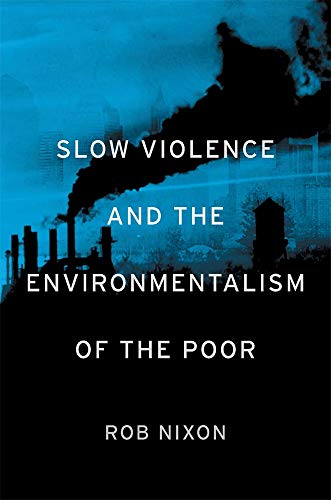Slow Violence and the Environmentalism of the Poor
Rob Nixon
BOOK REVIEW

Slow Violence and the Environmentalism of the Poor by Rob Nixon is not just a book; it's a clarion call that shakes the very foundations of how we perceive environmental degradation and its stark realities. Nixon, with penetrating clarity, unveils the insidious nature of what he terms "slow violence" - those gradual, almost imperceptible forms of harm that wreak havoc on the lives of the poor. It's a dissection of how this form of violence is often overlooked in our fast-paced, sensationalist world, where immediate crises capture our attention while the protracted decay of life quality in marginalized communities remains ignored.
Nixon's exploration dives into the complexities of environmentalism, revealing a chilling truth: the environmental crises faced by the impoverished are not merely ecological catastrophes but are deeply intertwined with social justice. This book compels you to confront the reality that climate change, pollution, and resource depletion disproportionately devastate those who are already vulnerable. The answer to the question of "whose lives matter?" reverberates throughout Nixon's narrative, echoing the pressing need for a more inclusive environmentalism that bridges the gap between ecological and social justice.
As you traverse the pages of Slow Violence, you encounter narratives brimming with heart-wrenching stories of ordinary people whose lives are upturned by the slow, creeping threats of environmental change. Nixon recounts the struggles of individuals in regions ravaged by corporate malfeasance, drawing connections between systemic economic injustices and environmental degradation. You'll feel the anger bubble within you as you read about communities facing toxic wastelands, their lifeblood drained by entities prioritizing profit over human dignity. The emotional weight of Nixon's prose has the power to evoke a visceral response: does the suffering of the poor matter less than the profit margins of corporations?
The critiques of Nixon's work, however, are as varied as they are revealing. Some readers argue that his focus on slow violence may inadvertently dilute the urgency of immediate environmental disasters, suggesting a need for balance in advocacy. Others appreciate his scholarly approach but call for more actionable solutions to combat these injustices. This book doesn't offer a simplistic roadmap to salvation. Rather, it invites you to join a collective awakening; an understanding that transformation requires acknowledging these complex layers of suffering.
At the heart of Nixon's discussion lies the historical context of environmentalism itself - a movement that has often sidelined marginalized voices. The environmentalism of the past, predominantly shaped by voices from affluent circles, has neglected to address the intricate relationship between poverty and environmental degradation. Nixon's work is a poignant reminder that an authentic environmental movement must listen to and empower those who have borne the brunt of ecological neglect.
The claims and narratives presented in Slow Violence challenge the status quo, invoking a moral imperative for action. Readers are left grappling with feelings of outrage and compassion, ignited by tales of resilience in the face of adversity. You can't help but confront a troubling reality: for many, the fight against climate change isn't just an environmental concern - it's a daily struggle for survival.
This book has already ignited discussions among activists, scholars, and students across the globe, pushing them to rethink their approaches and deepen their understanding of how environmental issues intersect with social justice. Nixon's insights challenge us to dismantle the barriers that too often divide discussions of ecology and equity. As he hit the nail on the head, the environmental movement must diverge from simply preserving nature; it must also mean lifting up the voices of those who inhabit it.
By the end of your journey through Slow Violence and the Environmentalism of the Poor, you won't just emerge with knowledge; you'll be propelled toward a sense of responsibility. There's an underscored urgency in Nixon's prose that implores you to act, to advocate, and to engage in conversations that might deter the slow violence inflicted on the most vulnerable in our society.
As you put down the book, a haunting echo lingers: can true environmental justice exist without social justice? This thought doesn't just reside in the pages you just turned but follows you into everyday life. Will you choose to remain a mere observer, or will you stand up and become part of the narrative that demands change? The choice, undeniably, is yours. 🌍✊️
📖 Slow Violence and the Environmentalism of the Poor
✍ by Rob Nixon
🧾 368 pages
2013
#slow #violence #environmentalism #poor #nixon #RobNixon